One of Europe's most traditional religions has found a following in a place not normally associated with any sort of faith
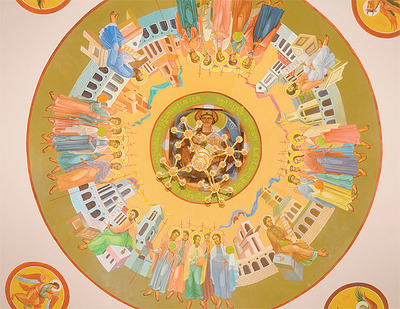 |
But in the midst of a city famous for all the wrong reasons is an unusual sight - the All Saints Orthodox Church (Moscow Patriarchate), a building with three golden domes and beautifully painted frescos inside.
The burly Russian who runs this outpost of Orthodox Christianity says that while he's not impressed by his surroundings, his congregation is growing and his church is doing a good job of taking care of the faithful.
"It is very difficult for me to come and stay here. I don't feel so good. All the sin has some bad energy and you can feel it. You can feel the atmosphere of the sin," said Archimandrite Oleg, whose secular name is Oleg Mikhailovich Cherepanin.
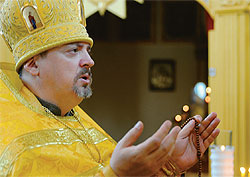 |
| LEADING THE WAY: Archimandrite Oleg in his church in Pattaya. |
"The present problem for me is that the sins in Pattaya are like a part of normal life. If a person commits a sin then he or she can go to church and confess, then they will understand that the sin is not a part of normal life, but it is like a sickness of the soul."
"But when sin begins to be a part of normal life and the person doesn't feel it, then this is a problem and this is the one we have here in Pattaya."
Archimandrite Oleg told Spectrum how his church started in Thailand.
"After many letters from Russian people living in Thailand were sent to the late His Holiness Patriarch Alexy II of Moscow, I was sent here in 1999 to see and learn about the spiritual situation of the people who went abroad, especially to this region and to Thailand," he said.
"What I saw was not only Russians, but also Bulgarians, Greeks, Romanians as well as Orthodox people from other western countries who are also Orthodox but didn't have any spiritual care, so I reported to His Holiness and he blessed me to try to organise an Orthodox parish in Bangkok, and that was the beginning of Orthodoxy in Thailand. The St Nicholas parish was opened in Bangkok and I was appointed as its rector."
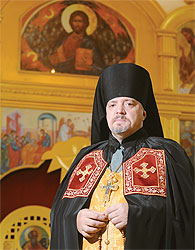
|
| SPREADING THE WORD: Archimandrite Oleg has seen a lot in his 11 years in Thailand. |
"We are not called the Russian Orthodox Church we are the Orthodox Church in Thailand, which is for everyone. We have in our parish Russians, Ukrainians, Romanians Bulgarians, people from France and other countries, including Africa. Every Orthodox person is welcome.
"We decided to be under the Moscow Patriarchate. The Orthodox Church in Thailand is under His Holiness Patriarch Kirill of Moscow and all Russia, who was enthroned in February 2009. The Patriarch visited Bangkok when he was Chairman of the Department for External Church Relations of the Moscow Patriarchate in 2001."
"The Orthodox Church is the biggest religion in Russia with about 85% of the population followers. However, this doesn't mean that 85% go to church. When I say Russia, I mean all republics of the former Soviet Union. You know, the boundaries of a church are bigger than the borders of the Russian states because all Orthodox believers in former Soviet republics were under the Moscow Patriarchate."
For many years Pattaya has been a popular holiday destination for Russians, and many have retired there. Many have also landed themselves in trouble with the law, and Archimandrite Oleg is always ready to lend a hand to those who need it.
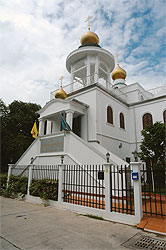 |
| LANDMARK: The All Saints Orthodox Church in Pattaya. |
"I explain to everyone detained there that it is not possible for the parish to help everyone. I tell them to send the money back when they reach home because we have to help others. So far, we have already helped about 90 persons, mainly women who are prostitutes, each with about $400."
"They came from Russia, Uzbekistan, Belarus and other republics. They all promised and guaranteed to pay us back, but only one person did so during the past 11 years. I don't like to talk about this. When helping them, I try to close my eyes. I am also a human."
Despite some of the bad publicity, Russian tourists and residents of Pattaya attract, they are not the major criminals that some think they are, according to locally-based Russian Leonid Borisov.
"Recently I attended the opening of the Transnational Crime Centre in Pattaya where several hundred photos of wanted foreign criminals were displayed," he said. "People and the media in Thailand talk a lot about the Russian mafia, but I was amazed because I couldn't find even a single Russian person on the wanted list," added Mr Borisov who worked for seven years as an interpreter in Vientiane, Laos, before moving to Pattaya and first working as a tour leader and now as a journalist on a Pattaya-based website.
The All Saints Orthodox Church in Pattaya has become a haven for not only European follows but also local converts.
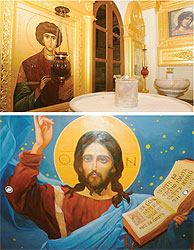
|
| DETAILED: Above, some of the church’s frescos painted by Thai artists. |
"My girlfriend is from Ukraine. I was a Buddhist but converted to be Orthodox because my girlfriend is also one. She and her mother told me that if we want to live together then I should be an Orthodox.
"I must say that this religion makes me feel good, and I have no problem with it. I go to the church here regularly."
Archimandrite Oleg says his church is slowly gaining a following in Thailand.
"Now there are around 20 to 30 Thai followers in Thailand. We could have more if we baptised them, but we can't do that if they don't understand what Orthodoxy is and how different it is, for example, from Protestants," he said. "Many of our Thai members are married to Russians, both women and men. They prefer to be Orthodox because it is easier for their family life."
After entering the church, most people are overwhelmed by the magnificent paintings covering the walls and ceilings, which were mostly painted by Thai artists from pictures taken at churches in Russia.
The services at the church are also memorable. A choir consisting of four Russian women regularly sings there, and Archimandrite Oleg's prayers make many feel like they are in a church in Russia.
"My activities are not only to make the divine service. People will come to a priest with various problems, like when they have no money; when they are sick; when they are in the immigration and other prisons or when they have problems with the police and so on. They will write a letter asking for help, and this doesn't apply only to Russians, but to all Orthodox believers of other nationalities as well."
There is one church in Bangkok and others under construction in Phuket, Ratchaburi and Koh Samui. A Thai priest, the Reverend Danai (Daniel) Wanna, stays in Pattaya most of the time.
"We will construct churches in places like Ratchaburi and Koh Samui because according to Russian tradition, it is very important to have monasteries outside the city. We believe that monks who pray for us must be in a quiet place with not much civilisation. We are now constructing a church in Phuket which will be the biggest of the four in Thailand.
"We have to complete the churches in Phuket and Ratchaburi and have a new one planned on Koh Samui. We also plan to open two more in Chiang Mai and Nong Khai and to build a new big church in Bangkok."
Many may think that Pattaya, with its reputation for sleaze, is an unusual location for a church.
"We decided to build a church in Pattaya because many Russians visit and reside there permanently. The church was opened in December 2009.
"I don't want to say anything bad about the Thai people who are working in the bars. The guilt that is going on in Pattaya lies mostly with foreigners. They come here with money."
Since arriving in Thailand 11 years ago Archimandrite Oleg has grown to love his adopted country.
"If we live in Thailand, we have to respect the country, its people and their culture.
"I have adapted to Thailand very well. I love Thailand and the Thai people. I have one request for the Thai government, to give me the possibility to die in Thailand. When I die, please put me in Thai soil," he said.
"I don't ask permission for Thai citizenship, but only ask for the possibility to have my body buried in Thailand, if it is possible.
"I must complain about the Russians because many of them live in Thailand for many years, but they know nothing about this country, its culture and other things. In order to get closer ties between our two countries, we plan to organise Thai language courses for the Russians and Russian courses for the Thais, free of charge.
"And when we talk about the language, it also means culture, because people must know each other better.
"Why free? Because the Thai people who are working as guides etc, are not so rich, and if we ask for some money, they will not join us."
What does Archimandrite Oleg regard as his biggest achievement in Thailand? "It was the people who completely changed, and for the better," he replied.
Writer:Maxmilian Wechsler
